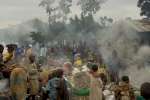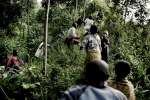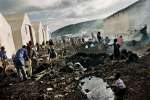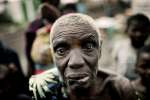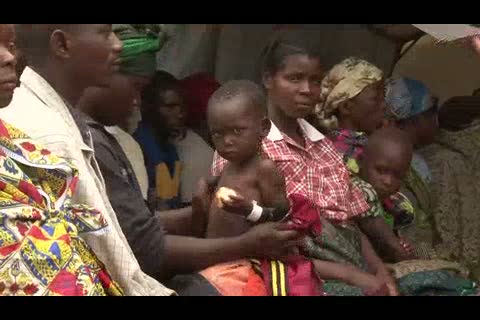UNHCR helps gay Congolese rejected by his mother find a new home
Making a Difference, 16 December 2014
CAPE TOWN, South Africa, December 16 (UNHCR) – Junior Mayema hid his sexual orientation while growing up in his native Democratic Republic of the Congo, but when his mother discovered that he was gay her anger knew no bounds.
"My mother is a pastor and she tried to kill me. It was very intense. Imagine, she carried me for nine months and she could arrange to have me killed. I couldn't believe it," the 27-year-old said before flying out of Cape Town last month to start a new life in the United States, where the lesbian, gay, bisexual and transgender (LGBTI) community is well established.
Mayema said his mother denounced him as evil and his family tied him up and tortured him. "Most of my family members and other people wanted to kill me . . . as they felt my life was a disgrace to them. I didn't feel safe being around my own family, l felt like an outcast."
Faced with this threat and antipathy in the Democratic Republic of the Congo, he decided to seek asylum in South Africa, whose constitution and national laws safeguard the rights of gays and lesbians.
He thought he would have a much better life in South Africa than in the DRC, where he was born into a middle class family in Kinshasa, one of five children. His parents separated when Mayema was a child and he went to live with his father, who worked for an international organization.
Mayema knew he was different, but tried to conform. Meanwhile, he enrolled in law school at the University of Kinshasa. His family, especially his mother, kept asking him about a girlfriend. "The family became very suspicious and they started investigating me," he said. When the truth came out, his life changed for ever.
Threatened by his intolerant family and ostracized by society, Mayema boarded a flight to Cape Town in 2010, ostensibly to visit a cousin, but on arrival he applied for asylum and contacted UNHCR for advice.
He soon became disillusioned with South Africa, starting with his asylum interview. "The officer said to me, 'If I don't like gay people, what are you going to do,'" Mayema recalled. "I thought he was going to deny me, but then I told him I had registered with UNHCR. He left to go to speak to some others and came back saying he was going to grant me [asylum]."
Hoping for an open, enlightened society, Mayema soon faced the same kind of discrimination that he had struggled against in Kinshasa. He found a place to live, but was regularly taunted by his homophobic landlord. "The landlord denied me my right to privacy; he would shout at me and only allowed female friends to come and visit me. Other tenants were treated differently. Sometimes he would beat me," Mayema told UNHCR.
Last July, after yet another confrontation, the young Congolese went to the police to lodge a complaint against his landlord. But Mayema claimed that he was taken to the back of the police station and beaten. "I still believe in God, because if he wasn't with me that day, I would have been killed," he said. With the help of a local human rights organization, Mayema launched a case against the police officers who allegedly beat him.
UNHCR staff, meanwhile, had already referred Mayema's case for resettlement when they heard of the alleged attack. Kizitos Okisai, the UNHCR resettlement officer handling his case, said it then took just four months for Mayema to be accepted for resettlement.
"It demonstrates how the international community can step up and help LGBTI refugees when they face persecution in their country of asylum and need to receive protection elsewhere," Okisai said, while noting that UNHCR was trying to help other refugees facing a similar situation in South Africa.
Mayema, meanwhile, is delighted to be going somewhere where he will be accepted. "I want to be able to make my dream come true to become a human rights lawyer. l can only do that in a place where l feel safe."
South Africa hosts some 65,000 refugees and more than 230,000 asylum-seekers, mostly from the Great Lakes region and the Horn of Africa. The number of LGBTI refugees is not known.
By Tina Ghelli in Cape Town, South Africa





















